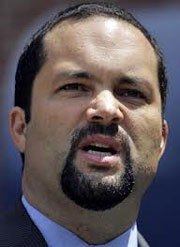
Time for a dignified minimum wage
By Benjamin Todd Jealous
This summer, minimum wage workers in California abandoned their posts at fast food restaurants and retail stores for spots on the picket line. They joined workers in cities across the country to demand an increase in the minimum wage.
Their efforts paid off last month when California Governor Jerry Brown signed a bill to raise the state minimum wage over the next three years to $10 an hour.
For the first time in years, wide-spread minimum wage reform is a real possibility, and we need to keep the pressure on. The current federal minimum wage is inadequate, outdated, and out of touch with the modern cost of living. In this country, a full-time job should be enough to keep a family above the poverty line and off of welfare.
Imagine a mother working a steady, full time, year round job at the federal minimum wage – $7.25 an hour. Her annual salary will amount to just $15,080. That puts her below the poverty line for a family of two, and well below the poverty line for a family of four. To make matters worse, her paltry salary depreciates in value each year, since the federal minimum wage is not tied to inflation.
At this rate, she could put in 45, 50 or even 60 hour weeks in an effort to keep her family off welfare, but she would still qualify for – and most likely need – public assistance.
This is hardly a hypothetical situation. Thirty three U.S. states and territories use the federal minimum wage, and there are over three million mothers and fathers just getting by on full-time jobs. These are not the unemployed. These are not the underemployed. These are the over employed and underpaid.
It is a travesty that millions of Americans work full time but still struggle to support their families. They are making a decision to be hard-working employees and responsible parents, but their employers are also making a decision – to pay them poverty wages.
Raising the minimum wage is imperative, and the potential cost to businesses and consumers is less than you might think. According to a recent study by DEMOS, raising the federal minimum wage to $12.25 ($25,000 for a full-time, year round worker) would cost large retailers just one percent of total annual sales, and it would cost consumers just 12 to 18 cents extra per shopping trip. At the same time, this change would lift more than 700,000 people out of poverty.
There are several opportunities to make this a reality. In November, New Jersey voters will decide whether to raise the state minimum wage to $8.25 and tie it to the cost of living. President Obama recently suggested increasing the federal minimum wage to $9. Even below the Mason-Dixon Line, two Maryland counties are considering bills to raise their minimum wage to $11.25.
It is time for a new social contract for people at the bottom of the economic ladder. We need to stand up with workers in California and other states and demand a dignified minimum wage on the federal level and in our communities. We can no longer afford not to.
Benjamin Todd Jealous is the president and CEO of the national NAACP.
This column was first published in USA TODAY. Contact: Ben Wrobel (917) 846-0658 bwrobel@naacpnet.org @NAACPPress